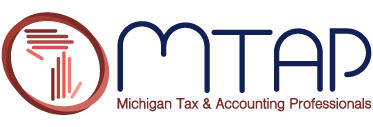
Time to Get Back into Accounting Services?
TCJA Impact on Tax Revenues Warrants Consideration
by Jon A. Hayes, Executive Director
Michigan Tax and Accounting Professionals
staff@michigantap.net
January 18, 2019 -- Trends in small business management, growing tax compliance requirements under many new laws, loss of income caused by the Tax Cuts and Jobs Act of 2017, and constantly-expanding technology are making practitioners reassess the offering of non-tax preparation services into their practices.
In recent years, S corporation elections have increased by nearly 20 percent according to the U.S. Chamber of Commerce. That's not surprising when you consider the veil of liability protection the entity offers for start ups and growing small businesses. And we all know that S corps must include a compilation when filing their annual corporate return. We also know 1040 clients who file a business schedule most likely require accounting to accurately report those business activities.
The Affordable Care Act is now fully implemented, and the dizzying compliance requirements for small businesses are entrenched. Practitioners now have increased work in documenting this compliance, especially when seeking to qualify for exemptions. Most of that compliance work has fallen into the preparer's lap during tax season.
And finally, with tax simplification under the TCJA reducing preparation revenues, practitioners must either make due with less or implement/expand services to make up for that financial loss.
Why Expand Your Accounting Services?
Wise MTAP members have often told me that homogenized, do-it-yourself accounting software programs like Quicken or QuickBooks don't give small business users fully accurate information or counsel, let alone accurate reports to meet growing compliance and regulatory requirements, even as these programs incorporate more artificial intelligence the software company claims will insure compliance.
"We spent hours during tax season adjusting a small business client's QuickBooks files before we could complete their tax returns," said one member whose practice was heavily-weighted in tax services but has now expanded into accounting. "After the 2016 season, our staff decided it was time to get back into accounting services by offering QuickBooks oversight services where we would review client accounting either on a monthly, quarterly, or bi-annual basis to insure they were accurate and ready to be used for tax preparation. It quickly morphed into more expanded monthly accounting since many clients realized they were spending valuable hours on this that they could use to be more profitable in their business."
And the impact on their 2017 tax filing season?
"It was the same as with our clients!" said the member. "We spent the bulk of our time in tax preparation since we had put client accounting issues in order during the off-season. We significantly reduced extensions and modestly increased our revenue. We had the time to solicit and add new clients. WE now had the time to do what we did best, and we made more money without increasing staff."
Another member who got back into the accounting services game in 2016 told me it opened the door to business consulting opportunities as the economy improved and clients looked for new opportunities.
"When we started walking clients through financial reports and projections that they had not been doing when handling those in-house, their perspectives changed. They started asking our opinions on things like adding new products or services, or making physical or virtual expansions. At first, we did this free-of-charge, but we quickly realized it required us to do research and analysis to provide an informed opinion, so we told those clients we would have to charge an hourly rate for that work. Nearly every one of them agreed and paid!"
Practice Value is Also Enhanced with Accounting Services
By adding or expanding accounting services, even for just existing clients, you not only expand revenue potential but you also create a more lucrative practice. Any practice sales expert you ask will quickly tell you that a practice offering accounting services sells for as much as 30 percent more than a tax-only practice because revenues are consistently generated year round and accounting clients have more loyalty to the practitioner.
More importantly, providing accounting services opens the door to many more service opportunities like business consulting, tax counseling and representation, payroll, and financial planning because that client trust factor grows much stronger. That, according to experts, increases practice value even more.
Industry watchdogs have been quite clear about the changes swirling in the tax preparation industry. The days of "gravy" 1040 revenue have been trending down since 2008 when nearly 65 percent of all 1040 filings were done by a professional. In 2016, that figure had slipped to 58 percent with experts predicting another 2 percent drop in 2017 as more do-it-yourself online tax prep options emerge.
Those figures have now been blown out of the water with the TCJA, with many predicting huge losses for tax preparers as the "W-2-type" returns almost completely disappear as taxpayers flock to free online preparation platforms to complete the simplified returns.
Even more concerning should be predictions that the IRS , in partnership with the states, will develop an online tax preparation platform where a taxpayer will go to irs.gov, log in, have most of their tax information automatically propagated onto the tax form with companies directly efiling employee/client documents to the IRS, and then having to either verify or slightly tweak the return before e-signing and clicking "file my return." Then, if they are owed a refund, the IRS will direct deposit that refund quickly into their account, and if they owe money, they will authorize the electronic withdrawal of that amount (or an adjusted amount if they decide upon an installment payment agreement should they lack funds to pay it in full).
It could be impossible to calculate the loss in tax preparation revenue this would bring to the tax preparer industry.
What Will You Do?
Tax preparers who continue to ignore the downward trend in tax preparation business will see revenues decline and their practice value diminish. Smart practitioners who recognize the coming loss won't experience as much loss because they will adapt with expanded services . . . like accounting.
There has never been a better time to grow a very profitable business if you're willing to take a calculated risk and invest in good CPE and/or training programs that establish or sharpen your skill sets. Coupled with targeted internal and external marketing that entices existing clients to utilize your expertise and new clients to use them, you can re-invent your practice and not only replace lost tax preparation revenues but increase profitability.
The result can be fewer, more lucrative clients providing much more income throughout the year . . . all in exchange for less time, especially during tax season.
It's an investment that can pay off quickly with more reliable revenues, and in the long run when you look to sell a more diverse, profitable business.
 The Association for Main Street
The Association for Main StreetAccountants and Tax Professionals.
Small Practice Accounting Services